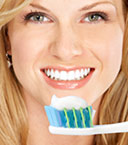Teeth Whitening
Brighter, lighter, whiter...
(Continued)
Summary
- Most teeth are possible to whiten by bleaching.
- Whitening of teeth can be achieved either by an external approach, where vital teeth are bleached by direct contact with carbamide peroxide, or by an internal approach, for bleaching non-vital teeth.
- During tooth bleaching, reactive oxygen produced from the peroxide causes the breakdown of highly colored organic compounds which leave the teeth looking whiter without changing the tooth structure. Increasing the concentration of peroxide provides a more rapid whitening effect.
- There is a risk of sensitivity following bleaching which varies with the concentration and time of contact of the whitening gels used. If it does occur, it usually lasts no more than one to four days.
- The stability of bleaching is related to many factors but should last from six months to two years.
- Bleaching has little or no effect on most of the common restorative materials used for fillings.
- Safety issues exist regarding use of peroxide containing products in very high doses. Do not exceed your dentist's or manufacturer's recommendations.



